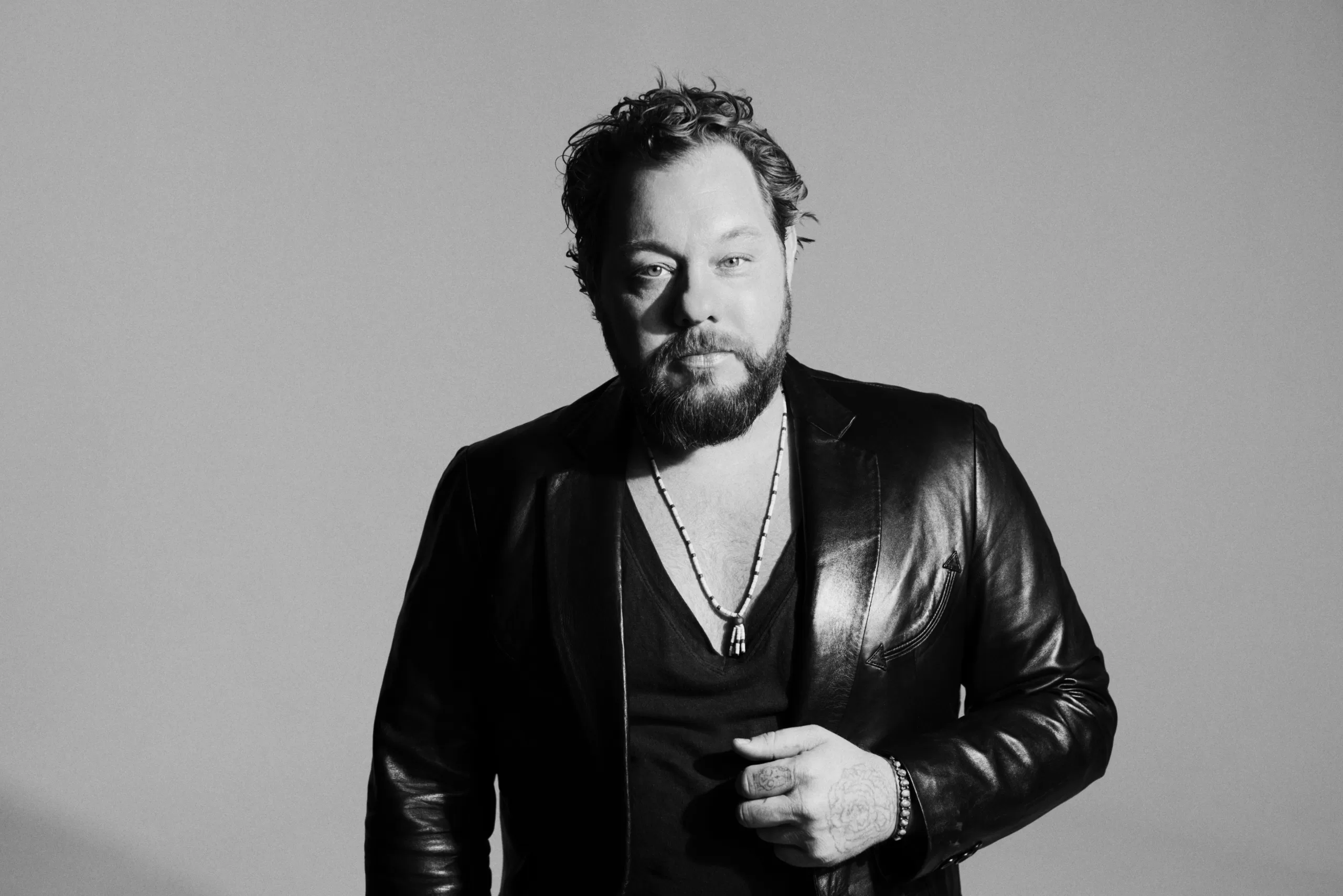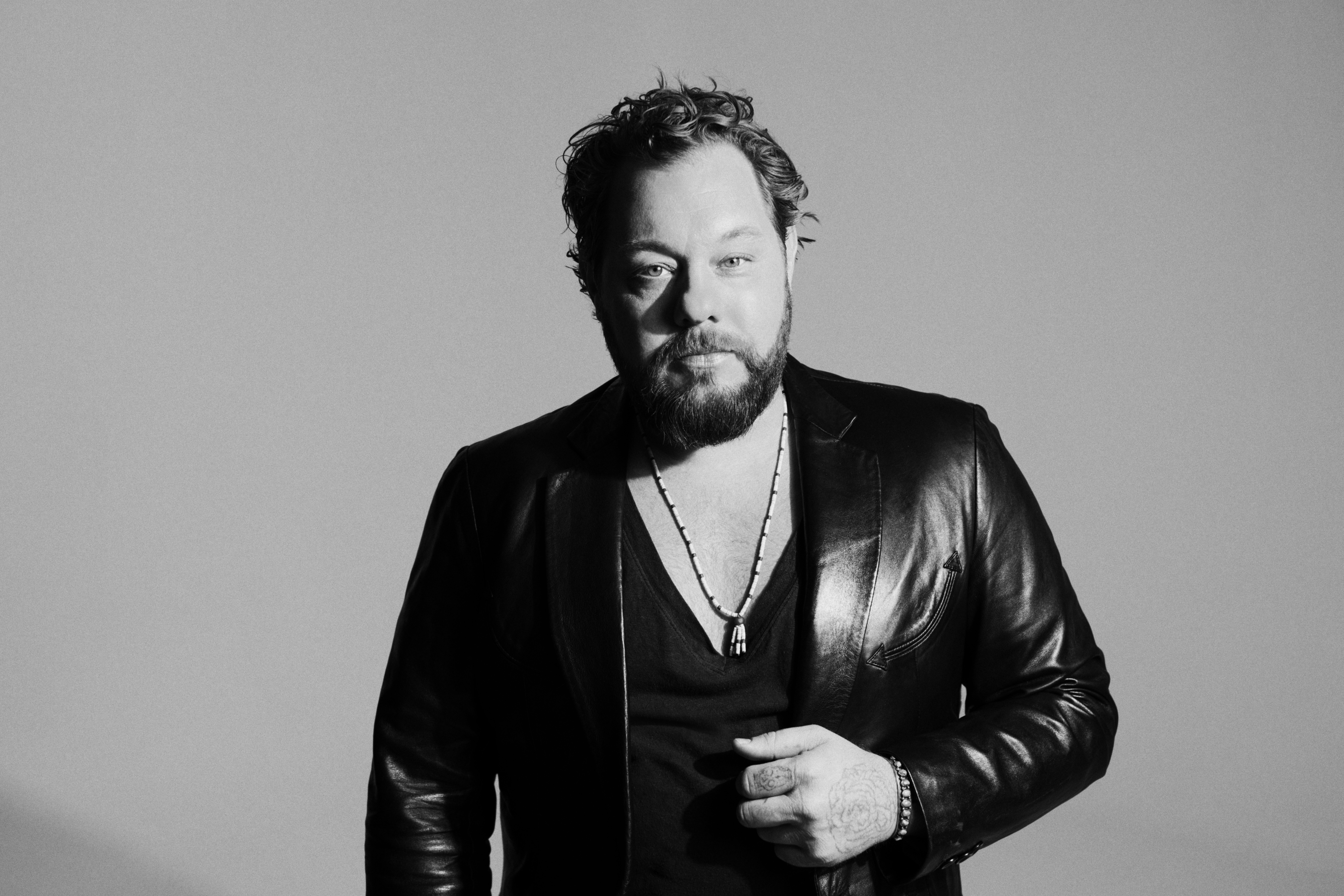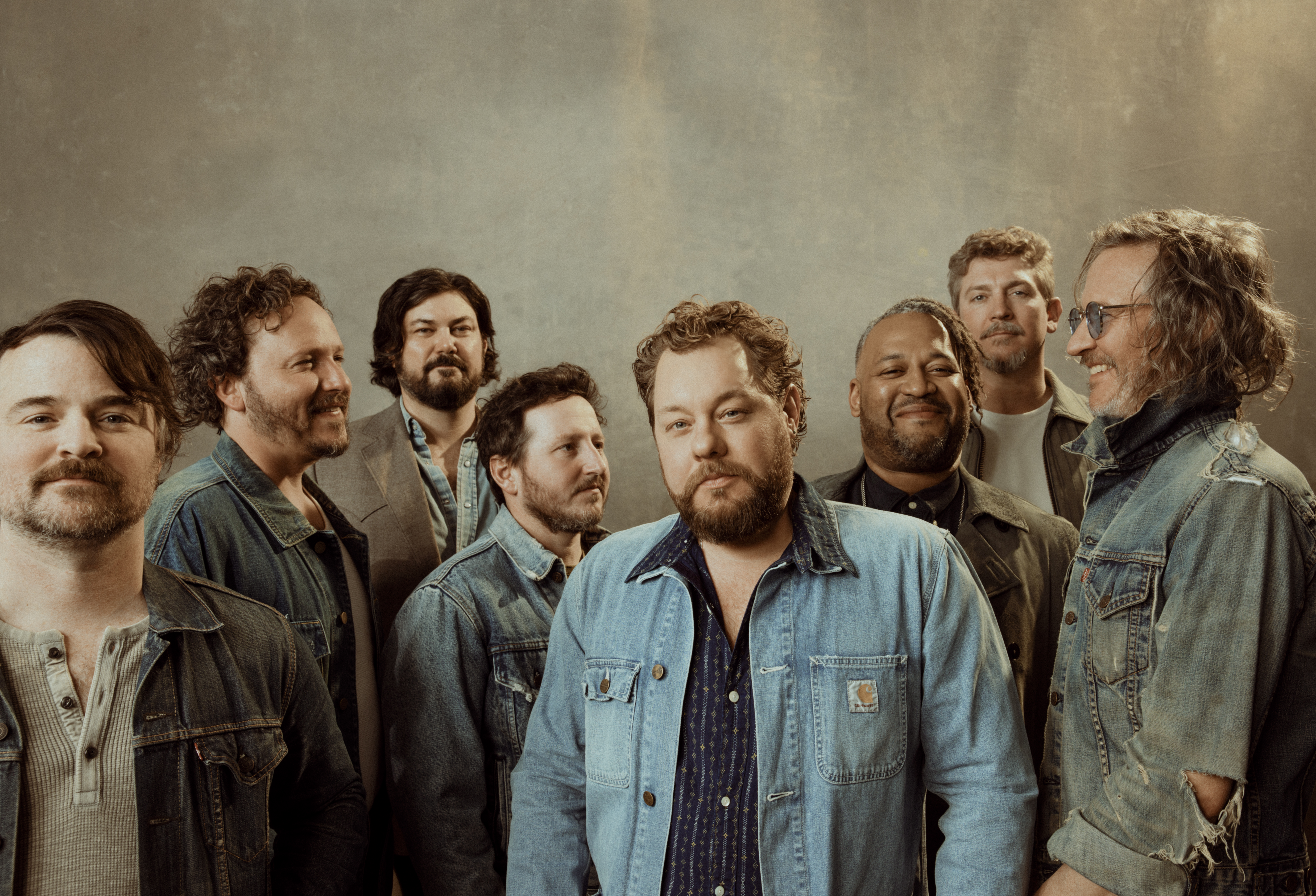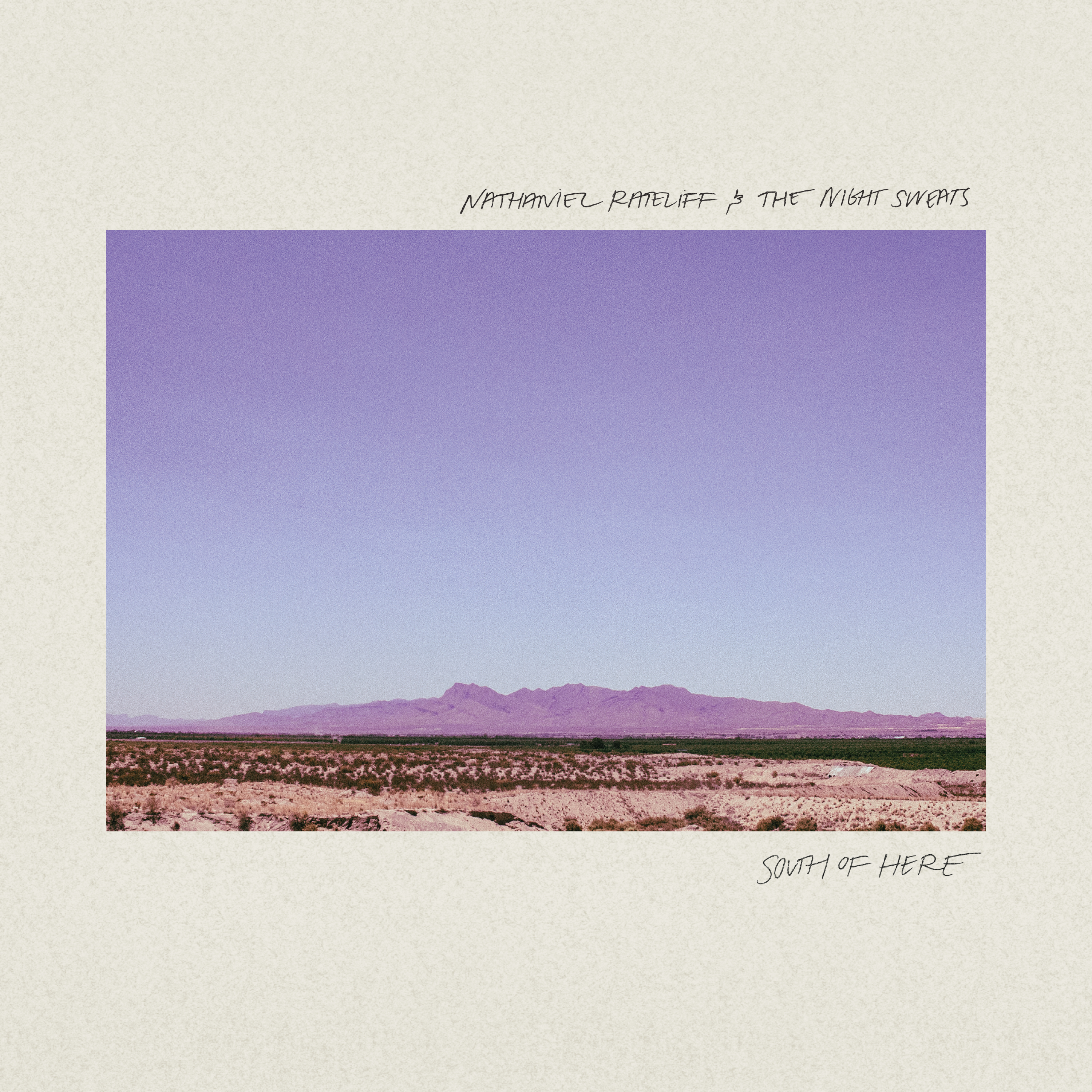NATHANIEL RATELIFF takes a long, hard look at himself – and can’t help but see the funny side.
The bearded, Stetson-wearing American breaks into a big grin when he considers his un-Jagger-like physique.
“I don’t have the rock star frame, you know what I mean?” he says in a laid-back drawl.
“People usually assume I’m the drummer. In some of my clothes, I just look like a labourer.”
Despite this self-deprecating assessment of himself, I can assure you that when Rateliff takes to the stage with his band The Night Sweats, he’s every bit the star attraction.
He lends his commanding voice to what could be described as “rock and soul” — ranging from brass-fuelled mayhem on songs such as S.O.B. and I Need Never Grow Old to emotion-wracked ballads like his new one, Center Of Me.
On a sultry summer afternoon, I find myself in the company of the genial Rateliff at a West London hotel. We find a quiet spot outside, far enough away from the rumble of traffic circling Shepherd’s Bush Green.
‘I struggled so hard and I still do’
Rateliff, 45, is in town to promote his fourth album with The Night Sweats, South Of Here, a soul-bearing song cycle that feels like a defining moment.
The singer who spent his early years in rural Missouri before moving to Denver, Colorado, aged 18, has had a less straight-forward career path than most.
He’s had to overcome a traumatic childhood, alcohol problems and record industry setbacks to achieve his dream of becoming an established artist.
Rateliff first came to wider recognition as a singer-songwriter in the late Noughties before unleashing the high-octane Night Sweats in 2015.
It’s a journey which has propelled him into the company of his heroes such as Willie Nelson and John Prine.
Led Zeppelin’s Robert Plant calls him “a real great blue-eyed soul singer” while Paul Simon has joined him on stage at Newport Folk Festival for a spirited rendition of Graceland.
South Of Here straddles both sides of Rateliff, finding room for majestic big band numbers like Heartless and Get Used To The Night as well as one of the most personal songs he’s ever written, the already mentioned Center Of Me.
“I just felt like it was important to take ownership of my experience,” he says. “Center of Me is about my inability to speak up for myself.”
Over understated acoustic guitar, he sings softly: “It’ll be ten more years til I say what I need/Stuck in my mouth when I try to speak/And nothing comes out.”
Rateliff tells me: “I’ve always been an introvert pretending to be an extrovert.
Nobody was diagnosing kids like me with attention deficit disorder and I struggled so hard.
Nathaniel Rateliff
“Maybe it’s because I’m a Libra, always weighing up both sides of the scales and finding it hard to say what I feel.”
He believes his insecurities are rooted in his troubled early years.
“I had learning disabilities, so at one point in one school, they put me in with Down’s Syndrome kids,” he says.
“At that time, nobody was diagnosing kids like me with attention deficit disorder and I struggled so hard.”
He pauses for a second before adding: “And I still do. I have a really busy mind.”
This can get him into difficulties when playing live, as he explains: “When I’m in front of people, my brain’s racing and sometimes I have to look over at Mark [Shust-erman], the piano player, to find out if we have one more chorus of Hey Mama or we’re done.”
Two South Of Here songs refer to the musician who has been with Rateliff throughout his life in music, Night Sweats bassist Joseph Pope III.
Heartless recalls when he and Pope III left their small Missouri hometown of Hermann to start a new life.
‘If you have a big voice, people want to hear it’
Final track Time Makes Fools Of Us All notes the moment his bandmate was diagnosed with testicular cancer. Thankfully, he informs me, “Joseph’s been in remission for years”.
Rateliff says: “We first met in grade four or five, so we would have been ten or eleven.
“We’d see each other on the school bus but we didn’t hang out until he was 16.”
When Rateliff left home, he took up living at a house in Hermann which “only cost us $147 a month”.
“Joseph’s older brother moved into the same house so Joseph would come over,” he continues.
“We just hit it off. Weed was hard to come by but we got stoned sometimes and we started making music together.
“To begin with, he did more singing and I just wanted to play guitar.”
The friends played in a band and also worked 12-hour night shifts at a local plastic factory, saving money to “move out west”.
“We decided on Denver,” says Rateliff. “It was icy cold in Missouri in winter and it felt like we were heading into the sun and limitless possibilities.”
It felt like a career but we still managed to play music the whole time.
Nathaniel Rateliff
Heartless tells of their “escape” and includes the lines: “Then the snow shut the highway down/But we kept moving forward.”
He recalls: “Joseph and I drove through this crazy blizzard. We passed barriers on the interstate which closed right behind us, so we were forced to move forward.”
After arriving in Denver, they both got jobs at trucking companies. “I did mine for ten years,” says Rateliff. “It felt like a career but we still managed to play music the whole time.”
Their band Born In The Flood became big on the local scene. “We’d be in rooms for a thousand or more people,” he says.
Rateliff remembers attracting interest from hard rock label Roadrunner Records but, after seven years, he had “emotionally moved on to playing solo material.”
“I didn’t want to showcase my voice by screaming,” he says. “It’s still one of the things I battle with. It seems that if you have a big voice, people want to hear it!”
Taking Pope with him, he released an album under the name Nathaniel Rateliff & The Wheel before securing a deal with Rounder Records for his 2010 solo debut In Memory Of Loss.
Despite much critical acclaim, Rateliff was dropped, yet another talented victim of the cut-throat music business.
‘We were kindred spirits’
But with the help of his manager Chris Tetzeli, he put out the follow-up Falling Faster Than You Can Run — then came his dramatic life-changing career swerve, The Night Sweats.
He wrote Trying So Hard Not To Know . . .
“it felt like a code I needed to crack.”
“I had friends who were doing stuff like that but I just wanted it to be more sweaty. I wanted it to be like Otis Redding at the end of a show, soaking wet.”
Pivotal to his phenomenal Night Sweats debut album was producer Richard Swift, a larger-than-life character with a big mop of dark hair who tragically died from alcohol-related issues in 2018.
“I first met Richard here in London,” says Rateliff. “He happened to be here playing with Delta Spirit and I got to hang out with him backstage.”
Years later, he sent Swift his initial Night Sweats demos. “Richard called me back late one night to say, ‘Hey man, I really dig this stuff.’”
The demos also attracted a deal from Concord Music Group, home of his old label Rounder as well as revived soul label Stax, an ideal setting for his new music.
Rateliff says: “They asked, ‘How would you feel about working with Richard Swift? and I replied, ‘I’ve already been talking to him’.
“So I drove out to his place in Oregon and discovered we were kindred spirits.
“We both loved music gear. We went to a little shop in Eugene and we each left with a guitar and a reverb pedal. He also got an amp made out of a milk crate.”
It starts off as being fun but at some point it just becomes about the booze.
Nathaniel Rateliff
Rateliff says Swift referred to him as his twin — “and then we realised we struggled with the same thing. The drinking”.
“We’d start the day off with the best intentions. I would always try to sing my part because I don’t think drunk vocal performances are great but if we broke for lunch or dinner, we would definitely start drinking.
“It starts off as being fun but at some point it just becomes about the booze — and you become the booze.
“It can be very lonely and the only time you feel good is when you start to drink again. Then you have more serotonin.”
Rateliff realised that “if you go too far, you just fray and fall apart. Richard’s death was a real eye-opener for me.”
He says that Swift’s wife Shealynn talked to him at her husband’s memorial service and said: “We can’t do one of these for you too.’”
The South Of Here song Get Used To The Night, originally intended for Rateliff’s 2020 solo album, And It’s Still Alright, sums up his feelings about the loss of Swift.
He says: “To me, that title means ‘get used to being dead’. There’s stuff in the song where I’m talking to myself but also talking about Richard.”
It was during 2017 when making the second Night Sweats record with Swift, Tearing At The Seams, that Rateliff decided to deal with his own alcohol problems — and life in general.
‘Everything needs to change’
Rather than checking into rehab, he decided to visit Miraval health retreat in the Arizona desert.
“There’s no booze on the property but it did offer equine therapy and meditation classes,” he says.
“Part of me was thinking, ‘If my career is going to be sustainable, everything needs to change, not just the drinking’.
“So, I went to that place for two weeks and, at the same time, Richard was drying out because he had been on a bender and his wife wouldn’t let us drink around him.
“We finished the second record sober.”
Seven years on, Rateliff reports that he’s keeping things under control and hasn’t had a drink in almost two months.
That said, he adds: “I love a margarita with dinner. I love a steak with a martini or a glass of red wine.
“I could tell you all the liquors I love — I love an aperitif, I love a digestif but my desire has changed as I get older.”
For Rateliff, his welfare and that of his band is top priority.
“It would be silly to give it all away just to have a good time, all the time,” he says.
Willie’s really open, especially if you play poker with him.
Nathaniel Rateliff
“I’ve worked for over 20 years to get here and I owe it to Joseph and I owe it to everybody’s families in this band.”
That hard work and self-discipline has given Rateliff the status he deserves and put him in hallowed company.
He was introduced to Willie Nelson by the country icon’s son Lukas, and shared a stage with the great man at his 90th birthday concert at the Hollywood Bowl.
“Willie’s really open, especially if you play poker with him,” says Rateliff. “He’ll take your money. It was a fast way for me to lose $500.”
Rateliff says another artist he got to know, who “really stuck with me”, was the late John Prine. “I hold him up there with Bob Dylan and Leonard Cohen,” he says.
Then he spares a thought for Townes Van Zandt, the revered Texan songwriter who died in 1997 aged 52 because of alcoholism.
“Townes was a big early influence on me,” affirms Rateliff. “His record Rear View Mirror is live recordings for about five people.
“He sings his best rendition of Pancho And Lefty. It’s heartbreaking. He drank his life away.”
And you just know what Nathaniel Rateliff is thinking: “There but for the grace of God . . . ”
NATHANIEL RATELIFF & THE NIGHT SWEATS
South Of Here



